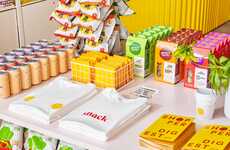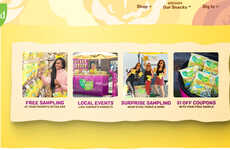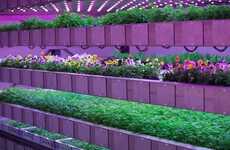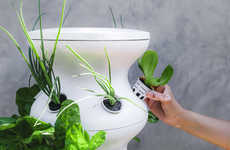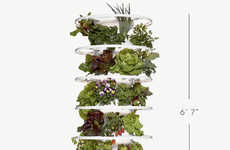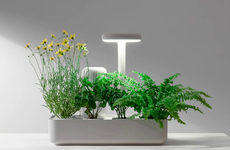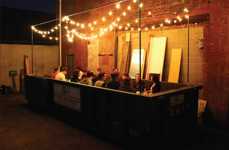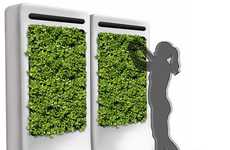
GrowNYC and Riverpark Restaurant Open an Urban Garden in the Middle of Manhattan
Bob van Leeuwen — August 8, 2011 — Eco
References: grownyc.org & good.is
When it comes to nature or produce, authenticity is hard to come by in a concrete jungle like Manhattan but the GrowNYC and Riverpark project might change that notion. There are farmers' markets where you can buy products of local producers, but most of them are not all that local. "Regional" would suit those local producers better.
Recently New Yorkers started growing vegetables themselves but now there's an actual farm right in the center of Manhattan. Just a few blocks away from Empire State, Alexandria Center was the setting of the first pop-up farm.
The construction of the buildings surrounding this site stalled creating empty spaces due to the recession. The developer started to use the site for growing vegetables for the adjacent restaurant, Riverpark (you can still dine amongst the vegetables). Now the pop-up farm is used to grow vegetables in wooden crates, which makes it all very mobile.
Using stalled sites, this pop-up farm by GrowNYC and Riverpark mixes recession cool with local and eco-efficiency.
Implications - As resources grow scarce in this world, society needs to think of ways to make more efficient use of energy and space. This pop-up farm is more than just a gimmick, but rather, it shows that we can make better use of unused space and think differently about the way we traditionally conduct business.
Recently New Yorkers started growing vegetables themselves but now there's an actual farm right in the center of Manhattan. Just a few blocks away from Empire State, Alexandria Center was the setting of the first pop-up farm.
The construction of the buildings surrounding this site stalled creating empty spaces due to the recession. The developer started to use the site for growing vegetables for the adjacent restaurant, Riverpark (you can still dine amongst the vegetables). Now the pop-up farm is used to grow vegetables in wooden crates, which makes it all very mobile.
Using stalled sites, this pop-up farm by GrowNYC and Riverpark mixes recession cool with local and eco-efficiency.
Implications - As resources grow scarce in this world, society needs to think of ways to make more efficient use of energy and space. This pop-up farm is more than just a gimmick, but rather, it shows that we can make better use of unused space and think differently about the way we traditionally conduct business.
Trend Themes
1. Urban Agriculture - The pop-up farm in Manhattan demonstrates the potential for growing food in urban environments, offering opportunities for sustainable and locally sourced produce.
2. Recession-inspired Innovations - The use of stalled construction sites for pop-up farms highlights the potential for repurposing unused spaces during economic downturns, creating new opportunities for agriculture and sustainability.
3. Mobile Farming Solutions - The use of wooden crates in the pop-up farm showcases the potential for portable and adaptable farming systems, enabling agriculture to thrive in urban areas with limited space.
Industry Implications
1. Hospitality & Food Service - The Riverpark restaurant's integration with the pop-up farm demonstrates the potential for restaurants and food service businesses to source their produce from local, urban farms, offering customers fresher and more sustainable ingredients.
2. Real Estate & Construction - The repurposing of stalled construction sites for pop-up farms presents an opportunity for the real estate and construction industry to creatively adapt and utilize available spaces during economic downturns.
3. Green Technology & Agriculture - The development of innovative farming solutions, such as the mobile pop-up farm in Manhattan, showcases the potential for technology-driven advancements in urban agriculture, creating opportunities for sustainable farming practices.
2.7
Score
Popularity
Activity
Freshness

